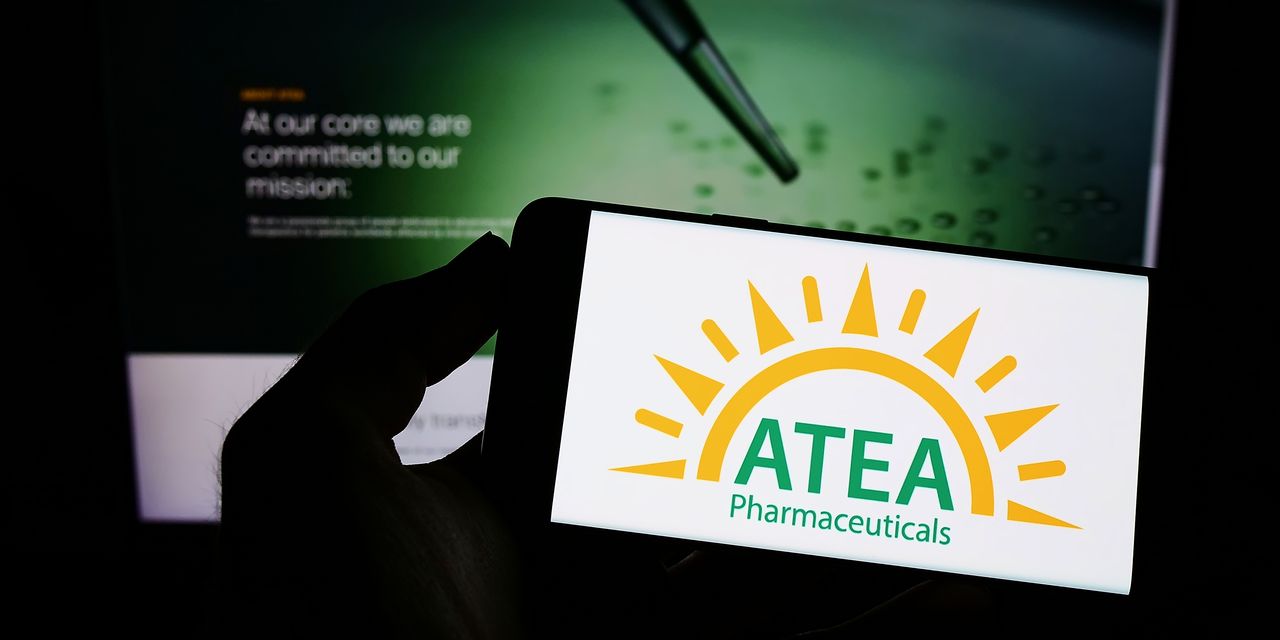Atea Pharmaceuticals,
a biotech working to develop antiviral treatments for Covid-19 and hepatitis C, might be worth more dead than alive.
If you bought all Atea’s (ticker: AVIR) shares and paid off all of its debt, the cash and other liquid assets remaining on its balance sheet would be worth more than what you spent.
It’s not alone. The collapse of biotech valuations since early 2021 has left a substantial number of biotechs in that position, which is known as having a negative enterprise value. It’s a stark sign of how grim things have gotten for small biotechs, and how far the sector is from recovery.
As of Wednesday, there were 23 biotechs with negative enterprise values in the
SPDR S&P Biotech ETF
(XBI) and the
iShares Biotechnology ETF
(IBB). Many more were on the brink. Of the roughly 280 stocks in the two ETFs, nearly 60 have enterprise values below $100 million.
The question, for a growing number of companies in the sector, is how long they can hold on.
Last week, a little-known company offered
Atea
a lifeline: Concentra Biosciences, which is controlled by investment fund called Tang Capital Partners, said it would buy Atea for $5.75 per share, along with a contingent value right that would give Atea shareholders 80% of the proceeds from any license or sale of Atea’s drugs.
Concentra’s offer represented a 55% premium over Atea’s closing price of $3.70 the day before the unsolicited proposal became public. But it still only valued the company’s shares at $479.5 million, significantly less than the roughly $618 million Atea had in cash and cash equivalents minus its debt as of the end of March.
On Tuesday, Atea issued a response: no way. Atea shares fell 12%, closing Tuesday at $4.12.
Today, Atea (ticker: AVIR) has a market value of $390 million. Its enterprise value, which is calculated by subtracting the company’s cash from the sum of its market value and its debts, was -$248.8 million as of Wednesday, according to
FactSet.
The evolving drama at Atea underscores the tension facing smaller biotechs struggling with diminishing cash balances and weak investor interest. Valuations are low: The SPDR S&P Biotech ETF, which tracks the sector, is down 50% from its early 2021 high. But even as biotech after biotech announces layoffs, executives and boards are clinging to hope of a rebound, and remain largely unwilling to accept that their companies are worth as little as the market says they are.
The clock is ticking. Smaller biotechs need money to spend on developing drugs, and don’t have product sales. With little ability to raise new money, it’s only a matter of time before the clock winds down.
How much of a problem that is for each of the companies depends on whether the cash they have on hand is enough to survive until funding conditions change, or they make can make significant progress on the medicines they are developing.
One of the companies on the brink is
Alector
(ALEC), which is working on treatments for neurodegenerative diseases. Shares are down 26% this year. FactSet calculates its enterprise value at -$7 million.
The company, which recently announced layoffs, says it has two years of runway. “We are well-funded until the end of 2025 and have several notable milestones ahead,” the company said in a statement.
The enterprise value of the drugmaker
EQRx
is -$465 million, according to FactSet. The company notes that it has recently restructured, and has $1.3 billion in cash. It says it expects to spend $275 million or less this year. “With our recent reset, our organization will have a significantly lower expected cash burn, which… opens up degrees of freedom to deploy our significant scale of capital,” the company said in a statement.
Rate hikes by the Federal Reserve since early 2022 have soured investors on risky, long-term bets like biotech. One leading biotechnology analyst, Michael Yee of Jefferies, wrote in early May that he expects biotech stock prices to start to rise in the second half of this year, as investors anticipate interest rates dropping in 2024.
If not, the sector could see more companies undergoing dramatic cutbacks. The heightened stakes could create an opportunity for companies like Concentra, which is targetting Atea.
Concentra has run this play before, most recently in March, when a small biotech called Jounce Therapeutics said that Concentra had agreed to buy it for $1.85 per share plus a
CVR,
a 75% premium over the closing price before the deal was announced.
Atea shares rose to $5.06 after Concentra’s offer. Concentra didn’t respond to a query from Barron’s about Atea’s Tuesday response to its offer. Atea declined to comment beyond its public statement. Given the structure of the proposed deal, it appears likely Concentra would dismantle the company and license its medicines.
Atea continues to develop bemnifosbuvir, its Covid-19 antiviral. It is also testing bemnifosbuvir in combination with another antiviral as a hepatitis C virus treatment.
Entities related to Concentra own 10.9% of Atea, according to a filing in May. Now, investors will wait to see whether Tang and Concentra continue their pursuit of Atea, and whether more offers like it come to other struggling biotechs.
Write to Josh Nathan-Kazis at [email protected]
Read the full article here













